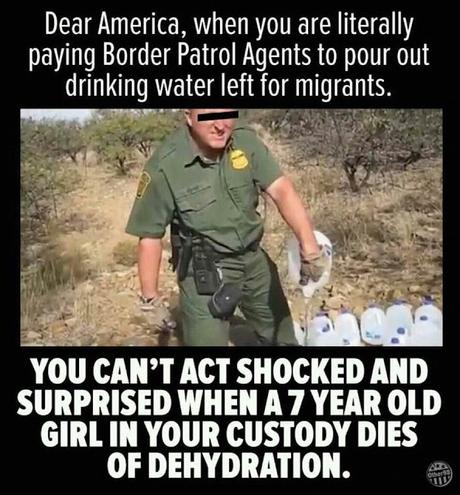
I think any decent American should be shocked and embarrassed at what our government officials are doing at the border -- at the direction of the Trump administration. You probably already know about the detention of people trying to ask for asylum at the border (which is not illegal), the separation of parents and children at the border, the current detention of about 15,000 children, and the gassing of immigrants seeking to apply for asylum.
Those actions are reprehensible, inhumane, and immoral. But it doesn't stop there. Border patrol agents are pouring out containers of water left for immigrants trying to cross the desert in our Southwest. This action undoubtably results in the deaths of human beings. Denying water to people in a desert is, in my opinion, a crime against humanity. It turns entering this country without documentation into a capital crime -- worthy of a death penalty.
We can debate about how restrictive our immigration policy should be, but I don't understand how any human can support denying water to people that need it in a desert (which too often results in death). Are we really such a vicious country that we would deny water to people without approved documents?
The following thought-provoking op-ed is by Justin Orlovsky-Schnitzler (a staff member of No More Deaths/No Mas Muertes) in The New York Times:
The desert borderlands of the Southwest are a death trap for migrants. In the summer, the temperature can rise past 115 degrees, and in the winter it can drop below freezing. Water is scarce; shade is almost nonexistent.
Some 8,000 people attempting to enter the United States have died in this region since the 1990s. Their shoes, empty water jugs and abandoned rosaries litter the landscape.
Volunteers from our organization, No More Deaths/No Más Muertes, hike year-round along remote trails in the Arizona section of the Sonoran Desert, which spans Arizona, California and northwestern Mexico. We leave water, food, blankets and other basic necessities along the desert’s migration corridors.
But the federal government is trying to make our humanitarian aid criminal.
Eleven months ago, a longtime volunteer with us, Scott Warren, was arrested in the small border town of Ajo, Ariz., for having provided food, water and shelter to two undocumented people. He was charged with two federal counts of harboring and one count of conspiracy to harbor. If convicted at his trial, which begins next month in Federal District Court in Tucson, he will face up to 20 years in prison.
The harboring charge against Mr. Warrenis part of a long-term government strategy to send a dangerous message: Humanitarian aid to migrants is a crime. The government has tried all sorts of maneuvers to prosecute good Samaritans in the desert — from charging our volunteers with harboring and transportingto issuing misdemeanors for “abandoning personal property” in a wildlife refuge (by leaving gallons of water for migrants) and using restricted roads without a permit.
These legal actions against our volunteers are just one component of a wider movement against undocumented people in the United States. The deployment of active-duty troops to the border, widespread family separations and increasingly violent rhetoric from the Trump administration are all churning wheels in an apparatus of policies intended to make crossing the border a death sentence.
In the past decade, migrant deaths have risen even as attempted crossings have decreased, because the militarized border pushes people into the desert’s most remote regions. It is impossible to carry enough water to survive even a two- or three-day trek through the barren reaches of the Sonoran. Without help, migrants die painful, cruel deaths — often alone, delirious with fatigue, hunger and thirst. . . .
Opponents of immigration contend that providing water and aid encourages migrants to make dangerous border crossings (a claim without evidence), but we know that people will continue to risk their lives to come to the United States so long as they feel unsafe in their home countries. Humanitarians give water to people who are dehydrated and food to people who are starving, regardless of their background or paperwork. . . .
Documents are not a prerequisite for human kindness. Everyone has a right to food, water and safe passage.

